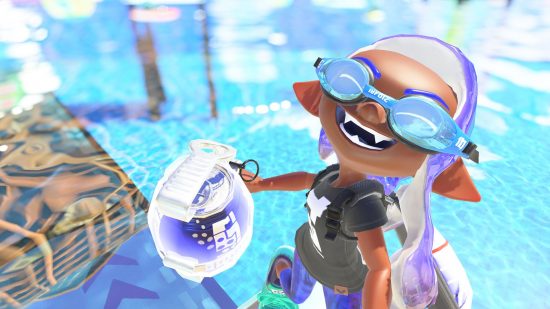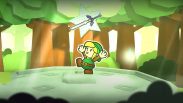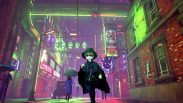Did you watch the most recent Nintendo Direct? If you didn’t, you really should. It’s one of the best we’ve had in a while, full of amazing looking JRPGs. As a Splatoon fan, however, my personal highlight was the new trailer for Splatoon 3’s updated Salmon Run mode. It looks great! One of the bigger reactions was to the music over the trailer. My own editor said that it scared her. So I thought, why not try to pin down what is actually going on with Splatoon’s music?
So, I’m going to go through it. I’ve listened to every single Splatoon song as research. I’ve also been listening to lots and lots of music for my whole life, which helps. I feel like I know enough to pick out different influences and vibes. I could be completely wrong, but that’s the challenge. Then I’ll take a magnifying glass to the slivers of music we’ve heard from the Splatoon 3 soundtrack, and try to work out why to some it can seem scary, yet I can find it so exciting.
It’s pretty hard to work out what else is out there that sounds similar to Splatoon music. The track ‘It’s Up To You’ by Polysics is the closest I came to something that sounds like it could slot into the soundtrack easily. But the influences are more eclectic than first appearances suggest. And even though it might appear to be wacky music for a wacky game, there are some absolutely stellar compositions that fuse together a wide array of genres.
The music of Splatoon
The music in Splatoon is composed by Toru Minegishi, Shiho Fujii, and Ryo Nagamatsu, three long-standing Nintendo composers. Between them, they’ve worked on 53 different Nintendo titles, from Majora’s Mask and Wind Waker to Wii Fit and Mario Kart 8. They’re not composers with some special obsession with the avant-garde – they’re eclectic. They have worked on grand symphonies and simple workout music. So, what let them get so loose with Splatoon’s soundtrack?
That would be down to the universe that they’re making music for. The games are set in dense cities, with a hyper fixation on fashion and music (someone who knows better than me could have a field day writing about the fashion in Splatoon). As the world itself is so focused on music, it can’t be mere background noise.

In Splatoon, the music is supposedly created by numerous in-game musicians. There’s a lot of them – Wet Floor, the Bottom Feeders, Ink Theory, Diss-Pair, ω-3, Dedf1sh, DJ Lee Fish, Bob Dub, the Chirpy Chirps, Hightide Era, Turquoise October, DJ Octavio – all with distinct sounds and great names. Even the mean company Grizzco Industries makes music, and their song ‘Happy Little Workers’ is a personal favourite.
The music of Splatoon is so fleshed out, that you can even attend live concerts with holograms of Pearl and Marina singing their Off The Hook songs. All of the artists have backstories and artwork for their music that reference various genres from classic Japanese city-pop to New York hip-hop. There’s such a deep, fictional music scene full of funny and zany characters, that the music has to be similarly hefty in what it brings to the table. What would music sound like in a world inhabited by these characters? What music would people make after a climate apocalypse? The composers probably asked themselves these questions. And then gave an amazing answer.
Now, I’m not discounting the more experimental stuff in any of the composers’ other works. There are a good few examples of excellently strange and quirky creations. But Splatoon is something different. The most straightforward songs in the game have slightly vicious rhythm guitar, big drums, loudly slapped bass, and squidgy synths whirling around the edges of everything, all while going a million miles an hour. They’re not full-on avant-garde, they’re just a little experimental, making me think of artists like Melt-Banana and OOIOO. Give Inkoming! a listen below; it’s pretty straightforward musically, but it’s still unmistakable as anything but a song from Splatoon.

However, when the songs aren’t straightforward is when things get interesting. The strangest tunes combine numerous instruments not commonly associated with each other, throw time signatures out the window, and make the drums sound like they were programmed by a gust of wind. This is when it gets much harder to call to mind influences, as it feels like there could be hundreds. So, let’s explore all elements of Splatoon’s soundtrack, from the in-game musicians and their different characters, to the strange compositions that have the ability to scare.
Splatoon soundtrack
We’ll start at the beginning, then. The original Splatoon was a big surprise when it released in 2015 for the Wii U. It’s a multiplayer shooter with high-level tactics akin to Overwatch. Nintendo didn’t do stuff like that. It’s mostly known for its marquee single-player experiences and arcade, family-friendly multiplayer games. So, it was a breath of fresh air in terms of gameplay. Same too for the music.
Splatoon has big tunes from the start. But, when you first hear them, it isn’t your usual ‘wow, these are some great songs’ moment, like when you first venture into Celeste. It’s more ‘what the heck is this?’ The soundtrack is genre fusion to the max, in the strangest way possible. I mean, listen to this:

In terms of popular music; it’s like Gorillaz, it’s kinda like Daft Punk, and that massive drum in the middle of it makes it ripe for a club remix. But it’s wonkier, wackier, and a little more jarring than any of those mainstream touchstones. Strange horns trumpet in the background, followed by a distorted electric guitar solo. Then the groove starts up, and the throaty vocoded singer evolves into a higher-pitched bop. It’s popular electronic music twisted and tweaked for the Splatoon universe. And it’s loads of fun too, which is key.
The biggest hit from the original game is Calamari Inkantation. With the warble of the singer, driving bass, and rocky drums, it’s one of the most straightforward Splatoon tracks, but it’s still so strange. It doesn’t matter what style it goes for, Splatoon music is a genre unto itself at this point. Sure, you can often hear the influence of Jet Set Radio’s soundtrack, but just listen to the first fifteen seconds of ‘Like You’ by The Replacements and tell me you don’t get Splatoon vibes. These songs are influenced by so many different things.
Splatoon 2 soundtrack
Splatoon 2 came out in 2017, only a few months after the launch of the Nintendo Switch. It perfects everything from the first game, sold gangbusters (it had the luxury of launching on a very good, very popular Nintendo console), and, thankfully, brought a whole set of stellar tunes. These songs aren’t just a rehash of the original game’s songs, however. You can hear whole new influences infecting everything.

Just as the gameplay is tweaked and extended in all the right directions, so is the soundtrack. The bands have more distinct personalities, the music feels like it’s drawing from a much wider array of styles, and individual songs feel like they came from different in-universe genres. ‘The Girl from Inkopolis’ has whole buckets of Towa Tei, the iconic Japanese electronic artist (originally a member of the band Deee-Lite, famous for their track Groove is in the Heart). Comparing it to his track ‘Mars’ makes the similarities really clear, but that’s still definitely not all that’s going on. I can kinda hear Cibo Matto in there with its wavy, off-beat drums. What I’m saying is, that no matter how hard you try, you can’t completely pin down these tracks.
Then there’s the Octo Expansion soundtrack, which has its own specific feel. ‘Nasty Majesty’, the track in the announcement trailer for the game, is a campy marching band cheerleader chant infused with dubstep and 90s hip-hop. This trailer builds hype for a big tentpole videogame, yet has music that sounds like this. That’s one of the best things about Splatoon in general. While it moves beyond Nintendo’s usual game genres, it keeps the strange, quirky, creative spirit of all their games alive by being nothing other than itself.

One of my favourite songs from Splatoon 2 is the Salmon Run theme, ‘Deluge Dirge’. Broken, discordant beats, and thick, driving cello create a deeply uneasy feeling. As the track continues, splutters of synth circle around and the composition gets busier, more urgent. The drums split and break like Aphex Twin and the sincerely bluesy strings sound like a metal riff that’s taken a detour via swing music. Everything comes from such disparate directions, yet it manages to mesh together. (I mean, just listen to ‘Ever Further’, with its harsh, meandering wind instrument whining in the background – it sounds like a Tom Waits song has just been shoved in the background).
Splatoon 3 soundtrack
Deluge Dirge is the track at the beginning of the trailer for Splatoon 3’s updated Salmon Run mode. It’s a track any player knows well, and may bring certain memories surging forward. But, as the trailer moves to show more of the new features, everything gets a bit weird. You hear some chanting as the soundtrack cuts out. Everything swells slightly until the orchestral drums from the original track return. Then things go all out wackadoo.

It sounds like Nintendo asked Harry Partch to make a Splatoon song. It sounds industrial, noisy, and powerful. It sounds… amazing. The Splatoon 3 soundtrack shows us immediately that this game is not like other games. The inescapable strangeness of it all is so invigorating. Nintendo clearly has bags of confidence, putting out a trailer for one of their biggest games of the year with music that sounds like it does. It’s mind-boggling. There isn’t anything clever to say about it, I’d rather just bathe in the sheer freedom that these composers clearly have.
That’s what I keep coming back to; the sense that the people making the music for Splatoon just sound like they’re having the time of their lives. That’s not to say that the people who make the great soundtracks for Assassin’s Creed or other games aren’t enjoying themselves because they’re more constrained, it’s just that it’s so rare to hear such a wide smörgåsbord of genres. Except, this feast isn’t served on different plates, every dish contains a little of every other, yet the balance is changed each time for a different flavour.

Compare the music in the Salmon Run trailer to the original announcement trailer and you’ll see what I mean. This trailer starts with atmospheric harmonics and barely-there noises, but by the time we reach the big city we’re back on familiar territory. But for this song to exist in the Splatoon 3 soundtrack alongside the song that scared my editor is what gets me so excited. There’s just so much loud creativity, existing in so many different ways. It makes me happy.
The stuff we’ve heard so far from the Splatoon 3 soundtrack isn’t scary, it’s exciting. If anything, it’s often funny. With a series that has as good a sense of humour as Splatoon, everything is meant to be a little bit funny. But no matter how you react, it’s exciting how much variation there is. As we hear more music, I’m certain that there’ll be straightforward bangers and off-kilter opinion-splitters. Either way, it shows us that Nintendo is experimental to the max, and that should be exciting for anybody looking to experience something new.












